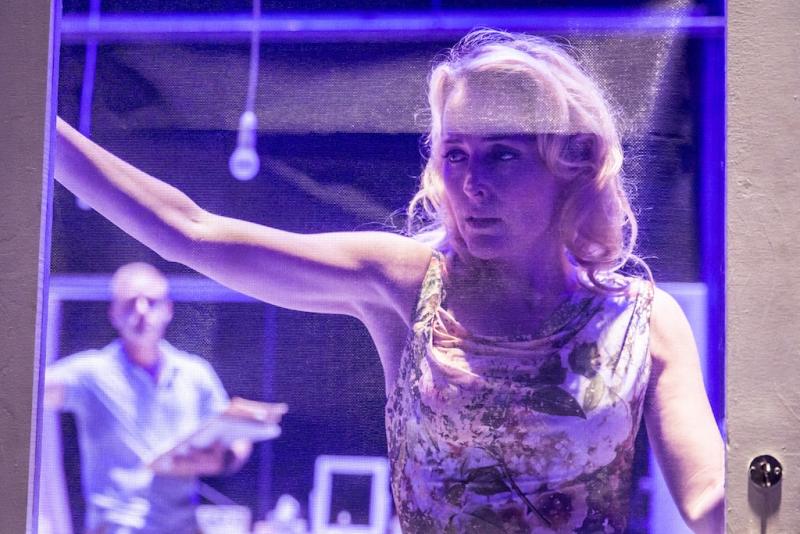A Streetcar Named Desire, Young Vic | reviews, news & interviews
A Streetcar Named Desire, Young Vic
A Streetcar Named Desire, Young Vic
Gillian Anderson seems born to play Blanche DuBois, in this inventive and intense rendering of the Williams classic

The latest production of Tennessee Williams’s sultry, brutal yet poetic masterpiece is mainstream theatre that dares to go out on a limb. Directed by Benedict Andrews, it may occasionally miss a beat, but its risk-taking comes with an innate sense of the play’s scorching pathos and an unnerving, dare one say exhilarating taste for the jugular that matches that of its primal male.
Gillian Anderson is Blanche DuBois, the Southern Belle whose sanity is fading with her fortunes, riding the streetcar named Desire to the New Orleans home of her sister Stella (Vanessa Kirby) in a last-ditch bid for survival. Spinning fantasies and lies to conceal the frailty of her situation, Blanche becomes locked in a misguided battle for her sister’s affections with Stella’s blue-collar husband Stanley Kowalski (Ben Foster, pictured below) that she will lose in spectacular fashion.
This might be one of the funniest Blanches ever One expects Andrews to deliver a certain originality and muscularity in his interpretations. Even so, his staging within the Young Vic’s round, with designer Magda Willi, is particularly striking. For a start, the pair eschew the customary recreation of down-at-heel New Orleans for a minimal, all-white set comprising the bare essentials of an apartment – bed, dining table, kitchen, lavatory, bath; the whole is so neutral and anaemic that it could be a hospital ward – a fitting place, one might say, for the mental illness that’s about to enter.
They then send this world into a spin, literally, cutely choosing the moment of Blanche’s first drink (of many, many drinks) to put the set into a near-constant, slow revolve. As the actors glide before us in a whirl of costume changes, manipulations and boozy, emotional, sometimes physically violent confrontations, the direction lifts the drama outside space and time, accentuating its mythic quality.
 There’s another effect, of creating a space that might be an arena, for the battle between the moneyed and the working class, old America and the new, self-delusion and rough reality – Blanche in one corner, Stanley the other, Stella both the referee and prize. But if it’s a boxing match, it’s one between mismatched fighters, the more powerful of whom is happy to keep punching when the other is on the canvas.
There’s another effect, of creating a space that might be an arena, for the battle between the moneyed and the working class, old America and the new, self-delusion and rough reality – Blanche in one corner, Stanley the other, Stella both the referee and prize. But if it’s a boxing match, it’s one between mismatched fighters, the more powerful of whom is happy to keep punching when the other is on the canvas.
The constant movement inevitably has its frustrating moments, when a sight line or a sentence drift away from you; intentionally or otherwise, a sudden stall in the revolve in the final scene left me cut off from Blanche in an appalling piece of timing. But these moments are outweighed by the sheer exhilaration of the invention, which also includes a powerful use of rock and blues (including PJ Harvey’s "To Bring You My Love") during scene changes that adds to the drama’s electrical charge. It’s not a production where anyone is likely to drift.
Anderson was born to play Blanche. She has the hauteur at her fingertips, and the cracked mysteriousness in her eyes; she’s played Miss Havisham, after all, another woman eaten up by the past. The airs and aloofness are perfectly in place at the outset, as she arrives in a gold dress and heels to match her blonde locks, with a Louis Vuitton bag that she casually leaves at the door for Stella’s landlady to carry through. This might be one of the funniest Blanches ever, as Anderson drapes herself around any vertical prop in order to flirt with Stanley, and inveigles one drink after another with the alcoholic’s cheeky deceit.
In the first act I would have liked her to show more of the cracks in Blanche’s fragile psyche. It’s as if the actress is capturing Blanche’s desire to hold it together a little too well. But there’s menace as well as comedy in her seduction of a newspaper boy – an echo of former promiscuity and scandal. And as Stanley dismantles her façade, alienating her local suitor (a fine Corey Johnson) in the process, and Blanche is forced to revisit her guilt over her husband’s suicide, the disintegration is spectacular and heartrending.
 Though primarily a character actor in Hollywood films, and in just his second stage role, Foster is hugely impressive. Roaming the apartment like a pitbull, like Brando he captures both the ferocity and neediness of a man who knows that, romantically, he is punching above his weight. The scene in which he listens, unseen, as Blanche is describing Stanley as an “ape” is played with enormous subtlety, as is the chilling reversal of Blanche’s vain attempts at seduction, as he tells her, “We’ve had this date with each other from the beginning.”
Though primarily a character actor in Hollywood films, and in just his second stage role, Foster is hugely impressive. Roaming the apartment like a pitbull, like Brando he captures both the ferocity and neediness of a man who knows that, romantically, he is punching above his weight. The scene in which he listens, unseen, as Blanche is describing Stanley as an “ape” is played with enormous subtlety, as is the chilling reversal of Blanche’s vain attempts at seduction, as he tells her, “We’ve had this date with each other from the beginning.”
As Stella, Kirby (pictured above, with Branwell Donaghey, Foster and Troy Glasgow) doesn’t resonate quite so well; it’s difficult to see her having come from Blanche’s world, or to see her in Stanley’s, yet there’s no tension to accompany the question. That said, we do believe her torn emotions between the two people. And her agonised scream of “Blanche” as her sister is carried off to the mental institution – suddenly rivalling Stanley’s famous cry for Stella herself – fittingly marks the play’s terrible resolution.
- A Streetcar Named Desire is at the Young Vic until 19 September
rating
Explore topics
Share this article
The future of Arts Journalism
You can stop theartsdesk.com closing!
We urgently need financing to survive. Our fundraising drive has thus far raised £49,000 but we need to reach £100,000 or we will be forced to close. Please contribute here: https://gofund.me/c3f6033d
And if you can forward this information to anyone who might assist, we’d be grateful.

Subscribe to theartsdesk.com
Thank you for continuing to read our work on theartsdesk.com. For unlimited access to every article in its entirety, including our archive of more than 15,000 pieces, we're asking for £5 per month or £40 per year. We feel it's a very good deal, and hope you do too.
To take a subscription now simply click here.
And if you're looking for that extra gift for a friend or family member, why not treat them to a theartsdesk.com gift subscription?
more Theatre
 The Line of Beauty, Almeida Theatre review - the 80s revisited in theatrically ravishing form
Alan Hollinghurst novel is cunningly filleted, very finely acted
The Line of Beauty, Almeida Theatre review - the 80s revisited in theatrically ravishing form
Alan Hollinghurst novel is cunningly filleted, very finely acted
 Wendy & Peter Pan, Barbican Theatre review - mixed bag of panto and comic play, turned up to 11
The RSC adaptation is aimed at children, though all will thrill to its spectacle
Wendy & Peter Pan, Barbican Theatre review - mixed bag of panto and comic play, turned up to 11
The RSC adaptation is aimed at children, though all will thrill to its spectacle
 Hedda, Orange Tree Theatre review - a monument reimagined, perhaps even improved
Scandinavian masterpiece transplanted into a London reeling from the ravages of war
Hedda, Orange Tree Theatre review - a monument reimagined, perhaps even improved
Scandinavian masterpiece transplanted into a London reeling from the ravages of war
 The Assembled Parties, Hampstead review - a rarity, a well-made play delivered straight
Witty but poignant tribute to the strength of family ties as all around disintegrates
The Assembled Parties, Hampstead review - a rarity, a well-made play delivered straight
Witty but poignant tribute to the strength of family ties as all around disintegrates
 Mary Page Marlowe, Old Vic review - a starry portrait of a splintered life
Tracy Letts's Off Broadway play makes a shimmeringly powerful London debut
Mary Page Marlowe, Old Vic review - a starry portrait of a splintered life
Tracy Letts's Off Broadway play makes a shimmeringly powerful London debut
 Little Brother, Soho Theatre review - light, bright but emotionally true
This Verity Bargate Award-winning dramedy is entertaining as well as thought provoking
Little Brother, Soho Theatre review - light, bright but emotionally true
This Verity Bargate Award-winning dramedy is entertaining as well as thought provoking
 The Unbelievers, Royal Court Theatre - grimly compelling, powerfully performed
Nick Payne's new play is amongst his best
The Unbelievers, Royal Court Theatre - grimly compelling, powerfully performed
Nick Payne's new play is amongst his best
 The Maids, Donmar Warehouse review - vibrant cast lost in a spectacular-looking fever dream
Kip Williams revises Genet, with little gained in the update except eye-popping visuals
The Maids, Donmar Warehouse review - vibrant cast lost in a spectacular-looking fever dream
Kip Williams revises Genet, with little gained in the update except eye-popping visuals
 Ragdoll, Jermyn Street Theatre review - compelling and emotionally truthful
Katherine Moar returns with a Patty Hearst-inspired follow up to her debut hit 'Farm Hall'
Ragdoll, Jermyn Street Theatre review - compelling and emotionally truthful
Katherine Moar returns with a Patty Hearst-inspired follow up to her debut hit 'Farm Hall'
 Troilus and Cressida, Globe Theatre review - a 'problem play' with added problems
Raucous and carnivalesque, but also ugly and incomprehensible
Troilus and Cressida, Globe Theatre review - a 'problem play' with added problems
Raucous and carnivalesque, but also ugly and incomprehensible
 Clarkston, Trafalgar Theatre review - two lads on a road to nowhere
Netflix star, Joe Locke, is the selling point of a production that needs one
Clarkston, Trafalgar Theatre review - two lads on a road to nowhere
Netflix star, Joe Locke, is the selling point of a production that needs one
 Ghost Stories, Peacock Theatre review - spirited staging but short on scares
Impressive spectacle saves an ageing show in an unsuitable venue
Ghost Stories, Peacock Theatre review - spirited staging but short on scares
Impressive spectacle saves an ageing show in an unsuitable venue

Add comment